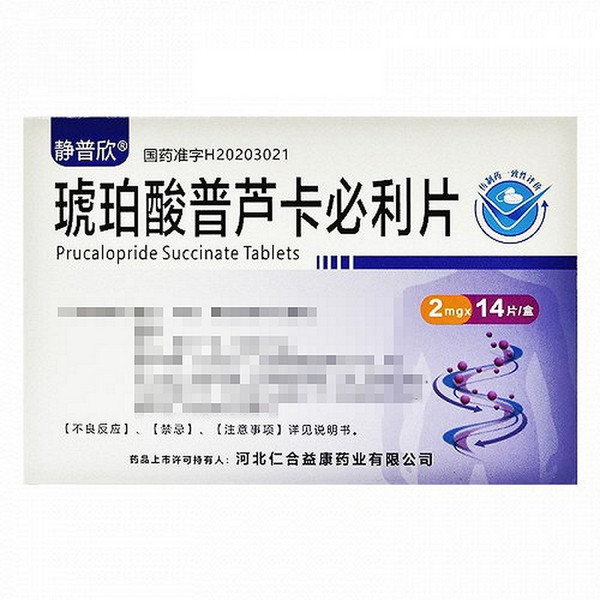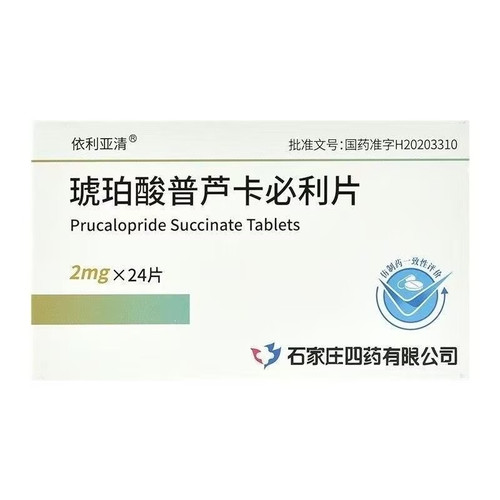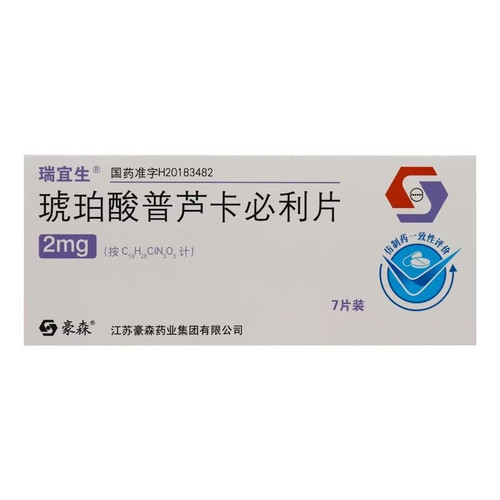Product Overview
[Drug Name]
Generic Name: Prucalopride Succinate Tablets
Trade Name: Jing Puxin Prucalopride Succinate Tablets 2mg*14 Tablets
Pinyin Full Code: JingPuXin ZuoZuoSuanPuLuKaBiLiPian 2mg*14 Tablets
[Main Ingredient]
Prucalopride succinate.
[Indications/Main Functions]
For the treatment of chronic constipation in adult female patients that is inadequately relieved by laxatives.
[Specifications]
Set
[Dosage and Administration]
Usage: Oral. Can be taken at any time of day, before or after meals. Adults: Take 2 mg once daily. Elderly patients (>65 years): Start with 1 mg once daily. Increase to 2 mg once daily if needed. Children and Adolescents: This product is not recommended for children or adolescents under 18 years of age. Renal Impairment: For patients with severe renal impairment (GFR <30 mL/min/1.73 m²), the dose is 1 mg once daily. No dose adjustment is required for patients with mild to moderate renal impairment. Hepatic Impairment: For patients with severe hepatic impairment (Child-Pugh class C), the dose is 1 mg once daily. No dose adjustment is required for patients with mild to moderate hepatic impairment. Given the specific prokinetic mechanism of action of this drug, daily doses exceeding 2 mg may not increase efficacy. If this drug is ineffective after 4 weeks of treatment, the patient should be reassessed and the benefit of continued treatment reconsidered. This drug has demonstrated good efficacy in double-blind, placebo-controlled studies of up to 3 months. If treatment is extended, patients should be regularly assessed for benefit.
[Adverse Reactions]
The most commonly reported adverse reactions related to drug treatment are headache and gastrointestinal symptoms (diarrhea, abdominal pain, or nausea), each occurring in approximately 20% of patients. These adverse reactions mostly occur during the initial phase of treatment and generally resolve after several days of continued treatment. Other adverse reactions have been reported occasionally. Most adverse reactions are mild to moderate.
[Contraindications]
Patients with hypersensitivity to the active ingredient or any of the excipients of this product. Patients with renal impairment requiring dialysis. Patients with intestinal perforation or obstruction due to structural or functional abnormalities of the intestinal wall, occlusive ileus, or severe inflammatory bowel diseases such as Crohn's disease, ulcerative colitis, and toxic megacolon/megarectum. Prucalopride succinate tablets are contraindicated in patients who have recently undergone intestinal surgery.
[Precautions]
Before treatment with this product, a thorough patient history and examination are required to exclude secondary causes of constipation and to ensure that the patient has not achieved adequate relief with laxatives for at least 6 months. Although laxatives have been used as temporary emergency relief in pivotal clinical trials, the safety and efficacy of this product in combination with laxatives have not been evaluated. The efficacy and safety of prucalopride succinate tablets have only been demonstrated in the treatment of chronic functional constipation. The efficacy and safety of this drug in patients with secondary causes of constipation, including those due to endocrine, metabolic, and neurologic disorders, have not been evaluated, and therefore, this drug is not recommended for these patients. The efficacy and safety of this drug for drug-related constipation, including secondary causes due to opioids, have not been demonstrated, and therefore, this drug is not recommended for such patients. Renal excretion is the primary route of elimination for this drug. A dose reduction of 1 mg is recommended for patients with severe renal impairment. This drug has not been studied in patients with severe and clinically unstable concomitant medical conditions (such as hepatic, cardiovascular, or pulmonary disease, neurologic or psychiatric disorders, cancer, or AIDS and other endocrine disorders). Caution should be exercised when prescribing this drug to these patients. Particular caution should be used in patients with a history of cardiac arrhythmias or ischemic cardiovascular disease. Appropriate management should be provided if palpitations occur during treatment with this drug. If severe diarrhea occurs while using this drug, the effectiveness of oral contraceptives may be reduced; alternative contraceptive methods are recommended to prevent potential oral contraceptive failure. Hepatic dysfunction is unlikely to have a clinically significant effect on the metabolism and exposure of this drug. There are no clinical data for patients with mild, moderate, or severe hepatic impairment; therefore, a dose reduction of 1 mg is recommended for patients with severe hepatic impairment. The tablets contain lactose monohydrate. Patients with rare hereditary disorders such as galactose intolerance, Lapp lactase deficiency, or glucose-galactose malabsorption should not take this product. This product should be used with caution in patients taking medications known to cause QTc prolongation. Studies on the effects of this product on the ability to drive or operate machines have not been conducted. Use of prucalopride succinate tablets, particularly on the first day, can cause dizziness and fatigue, which may affect driving and operating machines. No food interactions have been observed with this product.









